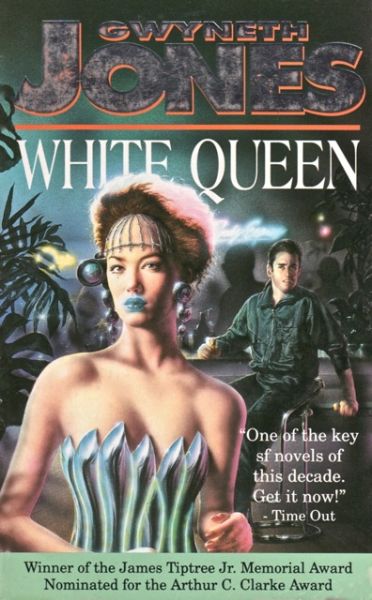The Other Winner of the First Tiptree Award
The White Queen (Aleutian Trilogy, volume 1)
By Gwyneth Jones

14 Sep, 2015
0 comments
Gwyneth Jones’ 1991 The White Queen is one of the two novels that won the first James Tiptree Jr. Award ever. Unlike the other winner (A Woman of the Iron People), I have not heard much about The White Queen, and have not been looking for a copy of it for decades. Having read it, I find myself unenthusiastic.
2038’s socialist revolution in America is big news, especially for Americans, but for journalist Johnny Guglioli it offers very little hope of an end to his exile in Africa. Johnny is, according to top American authorities, a carrier of a particularly nasty (although apparently not especially contagious) retrovirus disease and despite his claims that the diagnosis is a politically motivated sham, the new government is no more likely to let Johnny back into the US than the one it replaced.
What might earn Johnny a chance at a reassessment is to become the celebrity du jour. What better route to that than to interview Aleutians? Who, despite their misleading name, are the very first aliens to visit the Earth1.
The Aleutians look misleadingly humanoid (they might say humans look misleadingly Aleutianoid), but they’re definitely extraterrestrial. Although nothing in the science then known to humans suggests that faster than light travel is even possible, the Aleutians do not deny having mastered it. If Earth can work out some kind of deal with the aliens, Earth might gain the stars.
Might.
Another possibility is that the Aleutians might decide to claim large sections of the Earth for their own use, as has been the custom of technologically advanced imperialists throughout human history. Braemar Wilson believes what the aliens want from humans is in no way in our best interests. Johnny is just one of the tools she uses to oppose what she sees an alien takeover.
Both aliens and humans insist on seeing the other in familiar terms; neither truly understands the other.
~oOo~
Jones’ future history reads rather oddly now; it has been undermined by the vast political changes that have taken place since publication, changes already underway at the time. In the world of the book, the USSR still exists in 2038, although it, like the US itself, is no longer one of the two paramount powers. (The future history of Arnason’s A Woman of the Iron People has also been undermined by events; the details are very different but both novels are very pre-August Coup.) But of course, prognostication often fails. All too often we fail to understand the ultimate significance of events through which we are living. A failure which actually underlines the themes that inform this book.
Large parts of the book are set in a futuristic Africa that is not all that different from Africa as seen by Westerners in the 1970s. I am gradually coming to believe that there are large swaths of the world about which Western authors should *not write* — the result is usually unimaginative and boring. But then, since so much of the rest of the book fails as prediction, Future Africa isn’t alone in being implausible2 and a bit unimaginative.
I might have cut the book a bit more slack if I had any sympathy for the characters, but for the most part, the eight deadly words apply.
There are some interesting worldbuilding choices; all over the world, women are the convenient source of inexpensive workers, which in turn makes them targets for displaced male workers. There is a global conference on women so that governments can appear to be doing something. The conference is about as effective as the various world conferences on climate change have been, which is to say that many fine words are spoken and printed, but women continue to be exploited and victimized.
Although the Aleutians and the humans are very different in fundamentals, they’re alike in one stubborn trait: both species insist on slotting the other into familiar but inapplicable categories long past the point that this is a reasonable mistake. I wish that this were implausible, but, alas, I wouldn’t have to look far to find examples of people who insisted on applying their favourite filters to reality long after it became clear those filters were not reliable tools.
This book was definitely not to my taste but I may be in the minority here: not only was it deemed worthy of a Tiptree, but it was shortlisted for the Clarke and John Clute reckons it a classic. Readers interested in The White Queen and other Jones works can find them at Aqueduct Press.
1: Shades of the old Poul Anderson story in which the portentousness of the announcement of the first contact with an alien civilization is undermined by the fact the alien name for their homeworld happens to be Akron.
2: A lot of the future history is driven by Japan’s subsidence into the ocean, which may be a hat tip to Komatsu’s classic disaster novel, Japan Sinks, in which, not to give too much away, Japan sinks.
